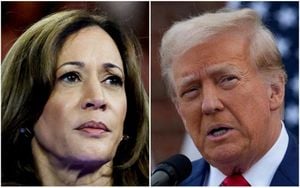Robert F. Kennedy Jr. has made quite the splash recently with his potential nomination as the Secretary of the Department of Health and Human Services (HHS) under President Donald Trump. This nomination isn't just stirring the political waters; it's raising alarms among public health experts and scientists across the nation.
Kaplan Means, an advisor to Kennedy and part of Trump’s transition team, spoke about this pairing, noting how both figures have tapped deeply—intentionally or otherwise—into the core sentiment of the Movement for America (MAGA), which emphasizes skepticism of institutions. At the heart of Kennedy’s agenda is his initiative, "Make America Healthy Again" (MAHA), which aims to grapple with chronic disease by reforming dietary guidelines and tackling perceived corruption within the food and pharmaceutical industries.
The MAHA movement emerged as Kennedy engaged with populist sentiments, appealing to those frustrated with the status quo yet alarmingly veering toward anti-establishment rhetoric backed by dubious scientific perspectives. Kennedy has long been known for his controversial views on vaccines, labeling them as part of what he sees as the "industrial food complex" and corporate corruption seeking profits over public health.
New reports indicate Kennedy promised sweeping changes at health agencies, even hinting at firing staff at the National Institutes of Health and establishing crowdsourced nominations for these replacements. Such overtures have led to heightened fear among scientists about who might fill key positions within these agencies.
Experts worry about the possible ramifications of Kennedy's tenure at HHS. Should he ascend to this role, his critics argue, there lies the potential for sidestepping decades of scientific research and undermining the public health achievements propounded since World War II. Stocks of some vaccine developers, including Moderna and Pfizer, tumbled upon news of his nomination, signaling Wall Street's unease with what Kennedy's health policy might resemble.
Many within public health agencies are taking stock of their careers as uncertainties loom. Reports indicate older scientists at the National Institutes of Health, Food and Drug Administration (FDA), and Centers for Disease Control and Prevention (CDC) are considering retirement, fearing the impact of radical viewpoints shifting the foundational policies of these institutions. Concerns were echoed at recent conferences attended by leading health officials, who reminisced about the protection offered by science-based policies now possibly at risk due to Kennedy's ideology.
Yet, Kennedy's proactive public stance has also found resonance among certain factions, as he has positioned himself as someone willing to take on the giants of big food and pharma, drawing both liberal and MAGA supporters to his side. His mantra of reform calls out unhealthy diets and the influence of corporations on food and health policy, attractively packaged amid widespread public discontent with chronic illness rates.
But not everyone sees Kennedy's approach as the right answer. For many scientists, the idea of rolling back established public health norms feels like stepping back to uncharted and dangerous territories. Notable figures like Barry Popkin, professor of nutrition at the University of North Carolina, have highlighted concerns over potential regressive policies under Kennedy's influence, especially with regard to childhood vaccination rates and society's overall health safety.
Opponents of Kennedy's views highlight real-world consequences of redirecting public health policy away from evidence-based frameworks. His approach could lead to widespread misinterpretation and mistrust about vaccinations, reigniting fears about diseases once thought to be under control. The concerns are not unfounded; public health agencies have often battled misinformation, especially during the pandemic, and the ripple effects of Kennedy’s ideology could very well manifest as outbreaks of once-absent diseases like measles or polio.
What's particularly troublesome, some experts argue, is the possible fragmentation of health policy formulated over generations of research from public health authorities, leaving patients vulnerable to the risks posed by disinformation campaigns.
This consideration recalls the historical narrative pointing to the foundation of public health institutions after World War II, which were constructed to provide reliable health policies steered by the consensus of scientific inquiry and extensive research.
Another point of contention arises from the nominating process of Kennedy, as the Trump administration has announced it is prioritizing aid from unconventional sources. With people like Kennedy bringing together outsiders and eccentric personalities around him, such as Elon Musk and various health entrepreneurs, the infusion of novel—and often radical—ideas poses substantial contrasts with the traditional health establishment.
Roaming the corridors of power and influence, RFK Jr.'s presence signals more turmoil as well. The anticipated shift toward deregulation, if realized, could challenge deeply rooted practices defending public health. Many health workers fear the trend of reducing government oversight might lead to lapses reminiscent of historical medical failures.
The narrative of change at HHS has gained attention not only for its influences on health policy but for the larger ideological battles mobilizing contemporary discourse over wellness, disease prevention, and the role of government versus voluntary health practices.
Moving forward, it's clear Kennedy's nomination is poised to ignite debates around health freedoms, regulation, and the power dynamics between political ideologies and scientific consensus. With opponents raising concerns about public health deteriorations, the response to Kennedy's policies could determine the fabric of America’s future health standards. The impending confirmation process will likely serve as both battleground and litmus test for these deep-rooted tensions.
All eyes will remain fixed on how the Kennedy nomination plays out, as the stakes are high for both public health initiatives and the trust of American citizens. With the threat of radical shifts looming large, the necessity for scientists and the public to engage actively with these policy discussions is more pressing than ever.



